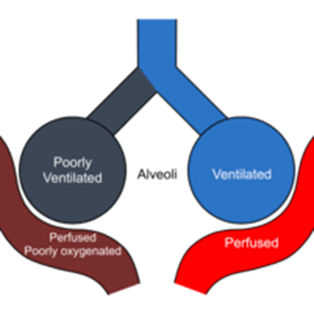Which of the following obstructive sleep apnea risk factors and behavioral therapies should the nurse discuss with the client?
(Select All that Apply.)
Sedatives does not impact the risk of obstructive sleep apnea.
CPAP compliance enhances quality of sleep.
Alcohol does not affect the risk of obstructive sleep apnea.
Obesity increases the risk of obstructive sleep apnea.
Positional therapy enhances client comfort.
Smoking increases the risk of obstructive sleep apnea.
Correct Answer : B,D,E,F
Choice A Reason:
Sedatives do not impact the risk of obstructive sleep apnea: This statement is incorrect. Sedatives, particularly those that cause muscle relaxation or depress the central nervous system, can exacerbate obstructive sleep apnea by further relaxing the muscles of the upper airway, leading to increased airway collapse during sleep.
Choice B Reason:
CPAP compliance enhances quality of sleep is correct. Continuous positive airway pressure (CPAP) therapy is a common treatment for obstructive sleep apnea. Compliance with CPAP therapy, meaning consistent and proper use of the CPAP device during sleep, is essential for effectively managing sleep apnea and improving sleep quality.
Choice C Reason:
Alcohol does not affect the risk of obstructive sleep apnea. This statement is incorrect. Alcohol consumption can worsen obstructive sleep apnea by promoting muscle relaxation in the upper airway, leading to increased airway collapse and more frequent episodes of apnea during sleep.
Choice D Reason:
Obesity increases the risk of obstructive sleep apnea. This statement is correct. Obesity is a significant risk factor for obstructive sleep apnea. Excess fat tissue around the neck can increase the likelihood of airway obstruction during sleep, contributing to the development or worsening of sleep apnea.
Choice E Reason:
Positional therapy enhances client comfort is correct. Positional therapy involves strategies to encourage sleeping in positions that minimize the severity of obstructive sleep apnea, particularly for individuals with positional OSA (where apnea events are primarily or significantly worse when sleeping in specific positions, such as supine). This statement is correct.
Choice F Reason:
Smoking increases the risk of obstructive sleep apnea: This statement is correct. Smoking can increase the risk of obstructive sleep apnea due to its effects on upper airway inflammation and respiratory function. Smoking cessation can be beneficial in managing sleep apnea and improving overall health.
Nursing Test Bank
Naxlex Comprehensive Predictor Exams
Related Questions
Correct Answer is D
Explanation
Choice A Reason:
Dulaglutide is inappropriate. Dulaglutide is a medication used to treat type 2 diabetes by improving blood sugar control. It is not indicated for the management of neurogenic bladder or urinary incontinence.
Choice B Reason:
Montelukast sodium is inappropriate. Montelukast sodium is a medication primarily used to treat asthma and allergic rhinitis by blocking leukotrienes, which are inflammatory substances that contribute to asthma and allergy symptoms. It is not indicated for the management of neurogenic bladder or urinary incontinence.
Choice C Reason:
Glatiramer acetate is inappropriate. Glatiramer acetate is a medication used to treat relapsing-remitting multiple sclerosis (MS) by modulating the immune system. It is not indicated for the management of neurogenic bladder or urinary incontinence.
Choice D Reason:
Oxybutynin is appropriate. Oxybutynin is a medication commonly prescribed for the management of neurogenic bladder and urinary incontinence. It belongs to a class of medications called anticholinergics, which work by relaxing the bladder muscles and reducing bladder spasms. Oxybutynin helps control urinary urgency, frequency, and incontinence associated with neurogenic bladder, including spasm-induced incontinence.
Correct Answer is B
Explanation
Choice A Reason:
Flail chest is incorrect. Flail chest is a condition characterized by multiple rib fractures, causing instability in the chest wall. While it can lead to respiratory distress, it doesn't directly cause ventilation-perfusion (V/Q) mismatch. Instead, it impairs the mechanics of breathing by compromising chest wall integrity.
Choice B Reason:
Emphysema is a chronic obstructive pulmonary disease (COPD) where the alveolar walls are destroyed, leading to a loss of surface area for gas exchange. This results in areas of the lungs that are well-perfused but poorly ventilated, causing a V/Q mismatch. The damage to alveoli leads to impaired ventilation, while blood flow may still be adequate, leading to hypoxemia (low oxygen levels in the blood).
Choice C Reason:
CHF primarily affects the heart’s ability to pump blood effectively, leading to pulmonary congestion and impaired gas exchange. However, it typically causes diffusion defects rather than a direct ventilation-perfusion mismatch. V/Q mismatch may occur secondary to pulmonary edema, but it’s not the primary mechanism of respiratory failure in CHF.
Choice D Reason:
Guillain-Barré syndrome is incorrect. Guillain-Barré syndrome (GBS) is a neurological disorder that affects the peripheral nervous system, leading to muscle weakness and paralysis. While respiratory muscle weakness can occur in GBS, it doesn't directly cause ventilation-perfusion (V/Q) mismatch. GBS primarily affects nerve function rather than lung function.

Whether you are a student looking to ace your exams or a practicing nurse seeking to enhance your expertise , our nursing education contents will empower you with the confidence and competence to make a difference in the lives of patients and become a respected leader in the healthcare field.
Visit Naxlex, invest in your future and unlock endless possibilities with our unparalleled nursing education contents today
Report Wrong Answer on the Current Question
Do you disagree with the answer? If yes, what is your expected answer? Explain.
Kindly be descriptive with the issue you are facing.
